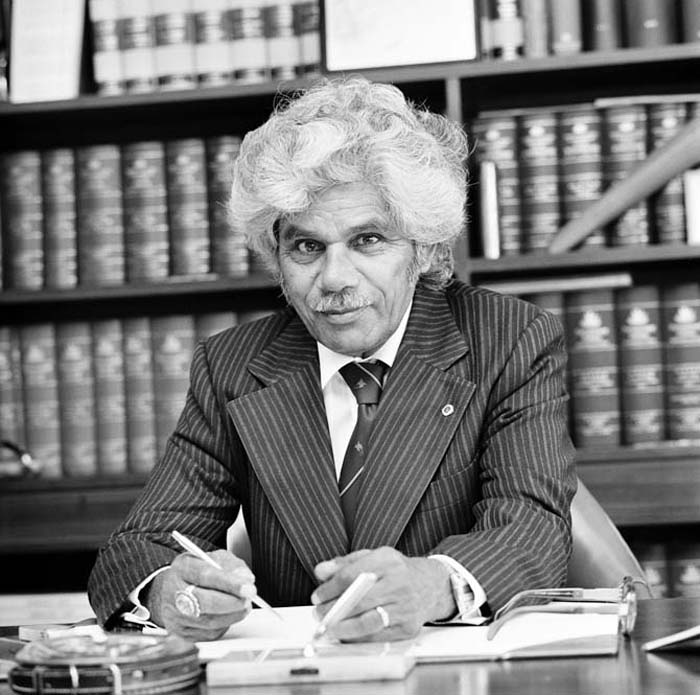Bonner was born on 28 March 1922 at Ukerebagh Island on the Tweed River, New South Wales. He was raised by his Aboriginal mother and grandparents. His father went back to England before Neville was born. Bonner left school at age of 14, and became a stockman, cane cutter and tree feller. He married Mona Banfield, his first wife, in 1943. He worked as a rural labourer on properties across Queensland until 1946, when he commenced employment at the Palm Island Aboriginal Reserve. Bonner was on the repressive Palm Island for a decade and half, and became the assistant settlement overseer. In 1960 the Bonners moved to Ipswich.
In 1961 One People of Australia League (OPAL) was formed, comprised predominantly of members from the mainstream Christian churches and service organisations. It was a liberal-conservative enterprise which, in retrospect, meant it fell out of touch with the prevailing thinking on indigenous rights and identity. It had an admirable goal in the promotion of cooperation between Indigenous and non-Indigenous Australians on indigenous issues, but it meant that OPAL was overtly assimilationist in orientation. OPAL was also far too aligned to militant conservative political forces. The Queensland Government of Johannes "Joh" Bjelke-Petersen (1968-1987) saw OPAL as a means to curtail the more pressing demands of Aboriginal political activists, and provided large monetary grants through OPAL to fund indigenous people in need of housing, education or welfare assistance. As a result, OPAL was critical of overt political activism, and mute at the retrograded political activities of the Queensland Government in Aboriginal and Torres Strait affairs.
Furthermore, there were particular links within OPAL to ultra-conservative perspectives. Heather Ryan (nee Trotter; soon to be Heather Bonner, his second wife) was the Secretary of the OPAL Ipswich Branch and was also a member of the OPAL State Board of Directors. Trotter had also been involved in Christian Anti-Communist Crusade, as part of its lecture circuit. The largely-American organisation of the Australian physician, Dr Fred Schwartz, from the early 1960s, was regarded by American liberal critics as far too extreme its right-wing politics. It was much closer to McCarthy’s anti-communism than anywhere near Kennedy’s anti-communism. It combined revivalist Christianity with militant anti-communism, and as such, any non-Christian political frameworks were immediately accused as fellow-travellers of Communism. In the Schwarz view of the world, only Christian belief is sufficiently patriotic in western countries, such as Australia and the United States.
Following the 1967 referendum, Bonner joined the Liberal Party. From 1968 to 1975 Bonner served as the OPAL President. Following the resignation of Liberal Senator Dame Annabelle Rankin in 1971, Bonner was chosen to fill a vacancy in the Senate; hence, he became the first Aboriginal person to sit in the Commonwealth parliament. Elected in his own right for the senate position at the 1972 Federal election, Bonner’s position as Australia’s first Aboriginal federal parliamentarian was secured. In 1972 Bonner married Heather Ryan, forming a supportive political partnership and a genuine loving relationship.
The tragedy of Bonner’s political career was that he was caught between the ideological struggle of 1970s indigenous politics and social conservatism. He was a respectable indigenous leader for mainstream Queensland and won his senate seat back at four more Federal elections (1974, 1975 and 1980). Bonner was a respected commentator on Indigenous issues and served on numerous Senate and Parliamentary Committees, and was a strong advocate for Indigenous rights. He served as the parliamentary representative on the Council of the then Australian Institute of Aboriginal Studies (now the Australian Institute of Aboriginal and Torres Strait Islander Studies). Unfortunately, there was little he could do in the realm of state politics where Bjelke-Petersen held a tight hold on Aboriginal affairs. OPAL was one of the few Aboriginal advancement or rights organisations to never affiliate with the Federal Council for the Advancement of Aborigines and Torres Strait Islanders (FCAATSI). Bonner had opposed the formation of the National Aboriginal Consultative Council, seeing it as a separatist move. Therefore, Bonner, an elder of the Jagera people was isolated from the emerging mainstream of Aboriginal representation. Nevertheless, he found his own dissenting voice. As a Liberal Party Senator from 1971 to 1983, Bonner crossed the floor 23 times to vote against his own party. The response of the Liberal Party was predictable if also unprincipled on its very own liberal ideology! Bonner was dropped from the winnable senate position on the Liberal Party ticket. Bonner resigned from the Party and contested the election as an independent; he narrowly missed retaining his seat.
In 1984 Bonner was appointed an Officer of the Order of Australia. In 1998 he was elected to the Constitutional Convention as a candidate of Australians for a Constitutional Monarchy.
See Neville Bonner on Scatterplot Matrix.
References
Neville Bonner – Fact sheet 231. National Archives of Australia. http://www.naa.gov.au/collection/fact-sheets/fs231.aspx, accessed online 24 September 2014.
Neville Bonner. Australian Biography. http://www.australianbiography.gov.au/subjects/bonner/bio.html, accessed online 24 September 2014.
Neville Bonner. National Museum Australia. http://indigenousrights.net.au/people/pagination/neville_bonner, accessed online 24 September 2014.
Heather Bonner: An Inspirational Ipswich Woman. University of Queensland Library. https://www.library.uq.edu.au/locations/heather-bonner-inspirational-ipswich-woman, accessed online 24 September 2014.
Neville Bonner. (2014, September 12). In Wikipedia, The Free Encyclopedia. Retrieved 10:01, September 24, 2014, from http://en.wikipedia.org/w/index.php?title=Neville_Bonner&oldid=625196384


